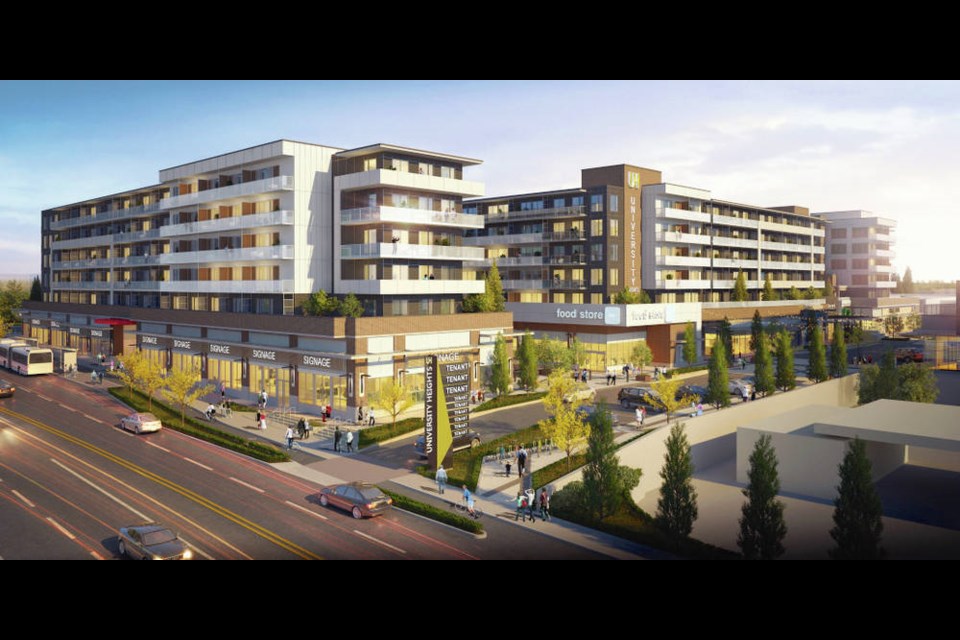The housing crisis, housing affordability challenges and the spectre of a climate emergency appear to have combined to light a fire under the District of Saanich when it comes to housing policy.
With dense developments such as University Heights coming to council this fall, a mixed-use proposal that includes a 24-storey residential tower from the developer behind Uptown in the works and the municipality laying the foundation for more residential in-fill, there is a marked change in direction at municipal hall.
Mayor Fred Haynes, who admits it would have been a bit out of character for Saanich to consider large residential towers in the past, said height might be part of the answer to the confluence of crises the entire region faces.
“The increased density is one part of a multi-faceted approach to bringing forward a diverse range of housing that would see increased density in our centres, corridors and villages,” he said, noting garden suites and allowing multiple smaller homes on single large lots are other feathers in the district’s quiver.
Haynes said areas such as Uptown and University Heights have been identified as ideal for increased density and the chance to establish centres where people can live, work and play, which, he said, will help address climate-change concerns.
“It’s about reducing the need to be reliant on cars,” he said, noting developers have been advised they would be wise to include daycare centres, health care services, commercial, office and retail space in mixed-use projects if they want approval.
At University Heights, Vancouver developer Wesbild plans a $230-million redevelopment of the old shopping centre that will include 657 rental suites, daycare space, cycling infrastructure, a public plaza, community spaces, a B.C. Transit hub, electric vehicle charging infrastructure and new commercial space.
The project is expected to be in front of council in September; the developer hopes to start construction in the spring, with completion in four years.
Bentley Harris, director of development for Wesbild, said it has had a great working relationship with Saanich and he expects the project could be a catalyst for more rejuvenation in that neighbourhood. “I expected in the next five to 10 years that corridor will take on a different appearance,” he said.
At Uptown, Shape Properties has asked for public feedback on its proposal to establish a 24-storey tower as part of the next phase of the site’s development. The project, at the west end of the Uptown site behind Whole Foods facing the Trans-Canada Highway, would add 350 new purpose-built rental homes and is playing hard on the themes of living and playing in one spot, given the proximity of amenities, services and shopping at a major transit hub.
Haynes said there is a broader vision to see as many as 8,000 units along that corridor over the next 20 years.
“That’s the density piece,” he said. “Meanwhile, in our single-family home area there is interest in allowing garden suites.”
The municipality has created a series of online brochures, checklists and reams of information on how homeowners can apply and build garden suites, either as mortgage helpers or to house family.
Nick Kardum, owner of Backyard Bungalows, which specializes in garden suites, said Saanich has made big changes and has embraced that kind of infill and made it easier for homeowners and builders.“They have been really receptive,” he said.
Kardum has 15 garden-suite projects in various stages of planning and development in Saanich. Most of them are being built by homeowners to house members of their family.
Meanwhile, Haynes said, there are people unable to afford homes in the region and a dire need for more units. “The system is [broken],” he said.
But he said the district has worked to become more efficient, streamline processes and improve and speed up service delivery. He said there is talk of bypassing council approval for certain projects that meet all required criteria.
“We are optimistic we can do better,” Haynes said. “But industry has to up its game as well.”
aduffy@timescolonist.com
- - -
To comment on this article, send a letter to the editor: letters@timescolonist.com



